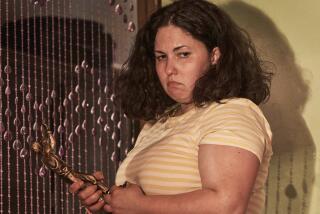NOTHING VEILED IN THIS ‘BRIDE’ OF 1935
- Share via
There’s nothing like the real thing--when it’s “The Bride of Frankenstein” (1935), which screens Thursday at 8 p.m. at UCLA Melnitz, along with “The Devil Doll” (1936).
The ambitiously reworked but misfired “The Bride,” which opened Friday, only suffers further in direct comparison to James Whales’ original, in which Ernest Thesiger’s deliciously evil Dr. Praetorius blackmails Colin Clive’s tormented Baron Frankenstein into creating a mate (Elsa Lanchester, oddly endearing in her ziggarut-streaked Afro) for his lonely Monster (Boris Karloff).
What’s most amazing about this much-loved classic is that it is so expressive and so controlled that pathos still actually outweighs camp, even when Thesiger, in all his arch enunciations, embodies its very essence. Tod Browning’s “The Devil Doll” is also fun: Framed Paris banker Lionel Barrymore, in a little old lady disguise virtually identical to that of Lon Chaney in “The Unholy Three,” exacts revenge on his evil colleagues using mad scientist Henry B. Walthall’s hideous shrinking technique.
Melnitz’s Monday 8 p.m. Contemporary French Cinema series continues with Agnes Varda’s “Ullyse” (1983) and “Documenteur” (1981), both of which display her mastery of mood and composition and intense awareness of the world around her. The first is an exploration of memory, triggered by a striking photo she had taken 30 years before of a naked man, a young boy and a dead goat along a rocky shore. “Documenteur” captures the alienated, drifting state of mind and emotions of a French woman living with her little boy in Venice and longing for the man absent from her life. As usual, Varda manages to be earthy yet feminine, expert at pinning down the fleeting moment. Melnitz information: (213) 825-2345.
The Nuart’s Monday evening Satyajit Ray series and Wednesday evening Ozu/Mizoguchi series flank a special Tuesday evening tribute to Samuel Fuller, which consists of “The Naked Kiss” (1964) and “Shock Corridor” (1963). They’re the ultimate in cult films, dynamic as they are delirious. The dizzying pre-credit sequence of “Naked Kiss” is justly celebrated; it has, among other matters, to do with ex-hooker Constance Tower’s troubles in a small town. In the second film, reporter Peter Breck feigns madness to investigate a murder in a mental institution--you can take it from there.
Screening with Ray’s “The World of Apu,” the final installment in his great Apu trilogy, is his superb 1962 film “Devi,” a tragedy of superstition set against a time when India was painfully beginning to make contact with the modern world. Soumitra Chatterjee and Sharmila Tagore, the husband and wife of “The World of Apu,” are also the rich but unfortunate couple of this film.
Comedy gives way to pathos in Ozu’s exquisite 1932 silent “I Was Born . . . “ when its two appealing little brothers inevitably discover that their father, a hard-working office clerk, is a nobody.
The larger truth that the boys must learn, of course, is that while their father may be humble in the eyes of the world he is in truth a remarkably good man, deserving their full love and respect. For all its acceptance of life’s inequities, this is a buoyant, positive film.
In contrast, in the succinct, swift 66 minutes of “Sisters of the Gion” (1936) Mizoguchi relentlessly, though (as always) compassionately, drives home the point that it’s a man’s world, at least in the precarious milieu of the Kyoto geisha. Nuart numbers: (213) 478-6379, 479-5269.
More to Read
Only good movies
Get the Indie Focus newsletter, Mark Olsen's weekly guide to the world of cinema.
You may occasionally receive promotional content from the Los Angeles Times.







